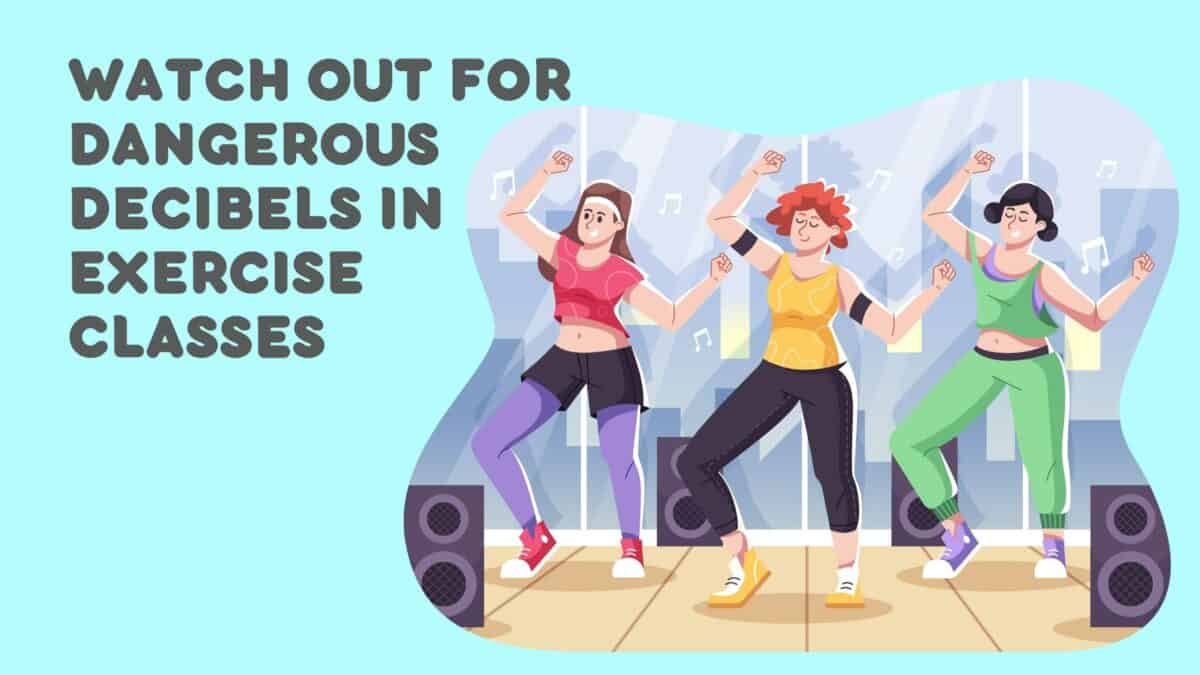Did you know that exposure to loud music in exercise classes is potentially harmful to your hearing health? Studies show that the music played in exercise classes, like indoor cycling, can reach high enough volume levels that can cause hearing loss.
Research on Noise Exposure in Exercise Classes
Studies have shown that the music in spin classes can be way too loud. This includes a 2016 study: Cycling Exercise Classes May be Bad for Your Hearing Health. Researchers investigated loud noise exposure in 17 classes at various major spinning studios in Boston. Using an app that measures decibels (dBA), units that measure sound, noise levels in these classes were recorded. Researchers found that the average length that people were exposed to noise from music in these classes was nearly 50 minutes per class. Noise exposure findings included:
- Maximum sound recording was 116.7 dBA
- The majority of class time was spent at 100 dBa
These findings reveal that the volume of music in these classes far exceeded recommended levels, putting hearing health at risk. Researchers found that the average noise exposure for one 45 minute class was nearly 9 times more than the recommended noise exposure for an 8 hour workday.
How Loud is Too Loud?
Sound above 85dBA is potentially hazardous for hearing health. This is the equivalent of busy city traffic, a vacuum cleaner, or a noisy restaurant.
- 30 – 40dB: soft music, average home noise
- 60 – 70dB: normal conversation, office noise, dishwasher
- 80 – 90dB: busy restaurant, air conditioner, subway
- 100 – 110dB: motorcycle, lawnmower
Experts suggest that people can be exposed to sound at 85dBA without risk to hearing. But for volume levels that exceed this, exposure should be adjusted significantly. The National Institute for Occupational Safety and Health (NIOSH) guidelines recommend reducing exposure time by half for every 3 decibel increase (after 85dBA):
- 85dBA: 8 hours
- 88dBA: 4 hours
- 91dBA: 2 hours
- 94dbA: 1 hour
At the level of 100dBA – the average level of noise in exercise classes identified in the 2016 study, safe listening time is no more than 15 minutes. This highlights how much of a risk the loud music played in these classes can be for hearing health.
Noise Induced Hearing Loss
Exposure to loud noise, one time or consistently, can cause noise induced hearing loss. Loud noise can damage the hair cells in the inner ear. There are thousands of hair cells in the inner ear that help convert incoming soundwaves into electrical signals that are sent to the brain. The brain is then able to further analyze these soundwaves and assign meaning to them which enables us to understand what we hear. Loud noise can cause these hair cells to lose sensitivity, impacting them from performing their essential function. Unlike other types of cells, hair cells in the inner ear do not regenerate. Humans are born with all the hair cells in the inner ear we will ever have and there are no medical treatments that can restore them. This means that when they are damaged, this is permanent, producing chronic hearing loss.
Tips to Protect Your Hearing Health
Fortunately, noise induced hearing loss is totally preventable! There are safety measures you can practice that significantly reduce your risk of developing hearing loss. This includes:
- Wear hearing protection. This includes headphones, earmuffs, and ear plugs which provide a physical barrier for the ears. This barrier reduces the amount of loud noise you absorb and the impact of loud noise. This is an easy way to provide your hearing with significant protection. This is especially useful if you commute, participate in exercise classes, work in noisier settings etc.
- Reduce exposure. In addition to wearing hearing protection, there are other ways you can reduce your exposure to loud noise. This includes maintaining lower volume settings on your electronic devices, avoiding environments that are noisy, opting for different exercise classes etc.
- Have your hearing tested. Hearing tests involve a painless process that measures your hearing capacity in both ears. THis checks for any hearing impairment and the degree of impairment. Taking hearing tests regularly allows you to maintain your hearing health and catch any changes early.
Integrating these tips can prevent noise induced hearing loss. Call us today to learn more and to schedule an appointment for a hearing test!

